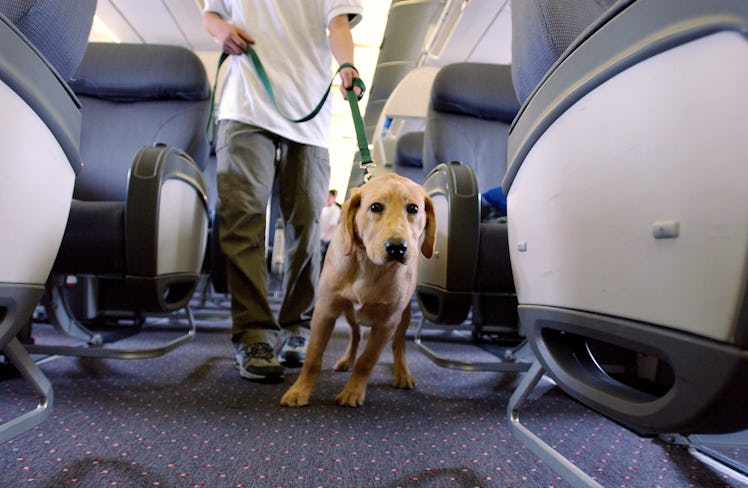
This Is What You Should Know About Southwest Airlines' New Support Animal Policy
Peacock and pig owners might want to take note, because Southwest Airlines is cracking down on the pets it allows on its planes. According to a statement released on Aug. 14, Southwest Airlines’ Support Animal Policy is changing in September to provide "clearer guidance" to customers. Here's what you should know before you attempt to board a flight with a furry, feathered, or scaly sidekick.
As of Sept. 17, 2018, Southwest will be banning "unusual or exotic" service animals, so it's safe to say that ferrets and monkeys are out of luck. The airline announced that it will now only be accepting support animals that are cats or dogs. In addition, Southwest's update states that each customers can only bring one such support animal with them, and that each cat or dog must either be in a carrier or on a leash at all times.
That's not all. In order to get your four-legged emotional support companion on the flight, passengers will still need to provide proof via "a complete, current letter from a medical doctor or licensed mental health professional on the day of departure."
“We welcome emotional support and trained service animals that provide needed assistance to our customers,” Steve Goldberg, senior vice president of operations and hospitality, explained in the statement. “However, we want to make sure our guidelines are clear and easy to understand while providing customers and employees a comfortable and safe experience.”
The airlines is making one exception with the "cat and dogs only" rule. Travelers with a disability who require a service animal also have the option to take a miniature horse on board if they need. While you won't need a doctor's note, you will need to provide "credible verbal assurance that the animal is a trained service animal" to the flight crew.
Lastly, Southwest clarified one policy that it's reportedly already been implementing in practice: the recognition of fully trained psychiatric support animals (PSAs) as trained service animals. Basically, a PSA is an animal that's been trained to complete certain tasks for individuals with certain mental health illnesses. In this case, a verbal confirmation is all that's needed to get your PSA on board. In the statement, Southwest also reiterates that it can deny boarding to any disruptive or unruly animal, so that's something to keep in mind.
Wondering why Southwest needs to spell this all out for travelers? It might sound pretty self explanatory, but a handful of flyers have been attempting to bring more exotic support animals on flights, and airlines aren't having it. In May, American Airlines banned "reptiles, rodents, and goats" from boarding their planes (I'm still scratching my head over that last one, TBH). Meanwhile, as of March 1, Delta passengers — who've previously tried to bring comfort turkeys, gliding possums known as sugar gliders, snakes, spiders and more, per the airline — started getting a stricter vetting process for their emotional support animals. My personal favorite? The woman who tried to unsuccessfully bring an emotional support peacock onboard a United flight. Yes, this is real, and yes, I'm shook.
It's safe to say that peacock owners have been warned. Seriously, though, if you travel with a support animal, service animal, or PSA, make sure you know Southwest's latest guidelines inside and out before you board.